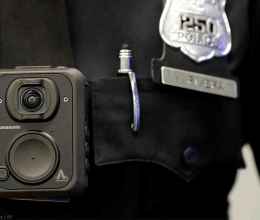
Los Angeles Police Department and the Los Angeles County Sheriff’s Department withheld data in violation of the California Public Records Act
LOS ANGELES – The Electronic Frontier Foundation (EFF) and the American Civil Liberties Union Foundation of Southern California (ACLU/SC) today jointly filed suit against two Los Angeles-area law-enforcement agencies over their failure to produce records related to the use of automatic license plate readers (ALPRs) — sophisticated camera systems mounted on squad cars and telephone poles that read license plates and record the time, date, and location a particular car was encountered.
EFF and the ACLU/SC filed requests with the Los Angeles Police Department and the Los Angeles County Sheriff’s Department under the California Public Records Act seeking documents relating to policy and training on ALPRs, as well as a week’s worth of ALPR data collected by the agencies in 2012. While the sheriff and police departments produced some materials, they failed to provide documents related to sharing information with other agencies, and neither agency has produced the data collected during the one-week period. The complaint was filed with the Los Angeles County Superior Court.
“Police can and should treat location information from ALPRs like other sensitive information — they should retain it no longer than necessary to determine if it might be relevant to a crime, and should get a warrant to keep it any longer,” said ACLU Senior Staff Attorney Peter Bibring. “They should limit who can access it, who they can share it with and create an oversight system to make sure the limits are followed.”
“Location-based information like license plate data can be very revealing,” said EFF Staff Attorney Jennifer Lynch. “By matching your car to a particular time, date and location, and then building a database of that information over time, law enforcement can learn where you work and live, what doctor you go to, which religious services you attend, and who your friends are. The public needs access to the data the police actually collected to be able to make informed decisions about how ALPR systems can and can’t be used.”
ALPRs can be mounted on a fixed point (such as a light post) or on a patrol vehicle, and can record up to 14,000 plates in a single shift. While police can match license plates against databases to find stolen or wanted cars, the systems keep information on every car — even where there’s no reason to think the car is connected to any crime. According to a June 2012 story in LA Weekly, the sheriff and the police departments conduct, on average, approximately 22 scans for every one of the 7 million vehicles registered in Los Angeles County. As of June, the departments reportedly logged more than 160 million data points.
EFF and the ACLU have asked a judge to issue a writ directing the agencies to hand over all requested records and award appropriate legal fees.
Contact: Vicki Fox 213.977.5227





